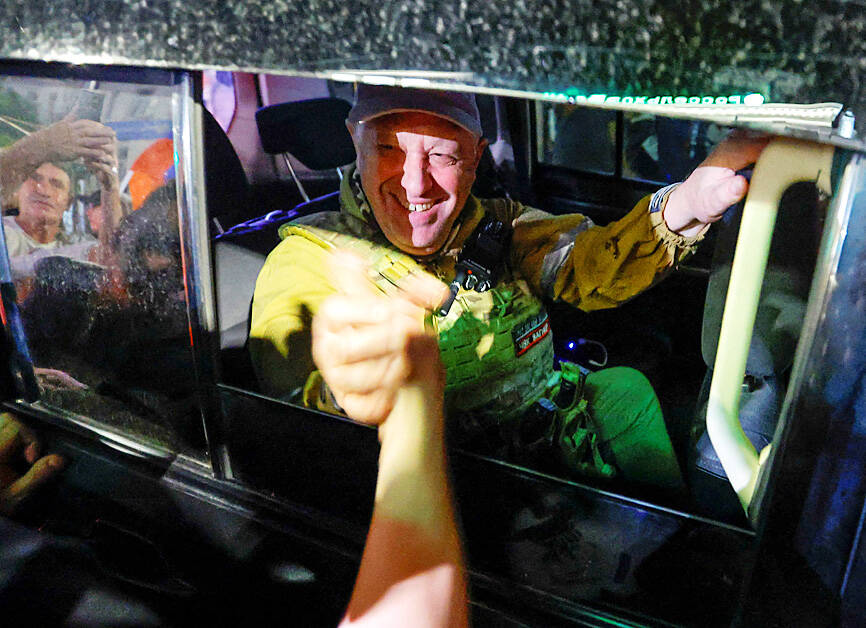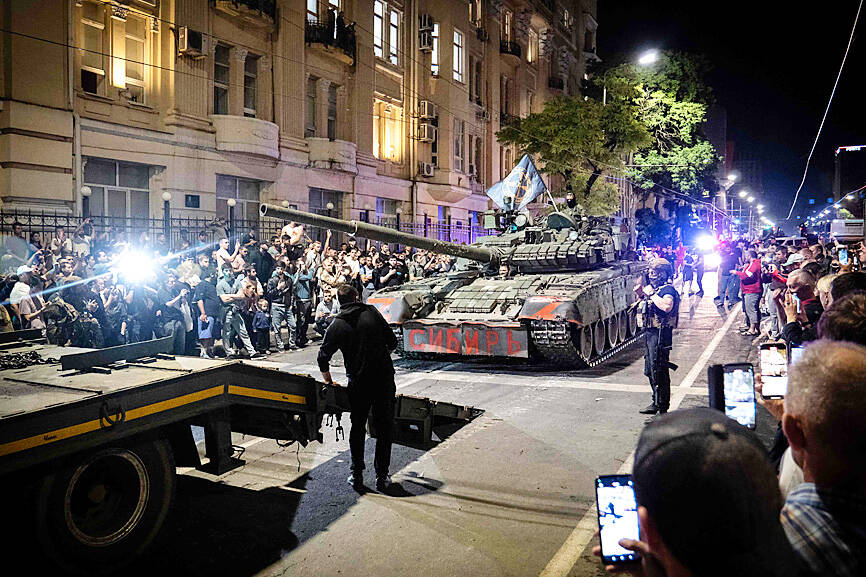Wagner Group mercenaries were returning to base yesterday as their leader agreed to go into exile after Russian President Vladimir Putin was forced to accept an amnesty deal.
The agreement appears to end the immediate threat that Yevgeny Prigozhin’s private army could storm Moscow, but analysts said Wagner’s revolt had exposed a fragility in Putin’s rule.
Security measures imposed under an “anti-terrorism operation” were still in place in Moscow, and Prigozhin’s exact whereabouts were unclear.

Photo: Reuters
However, his troops had left a military headquarters they had seized in southern Russia, and the governor of Voronezh on their route northward to Moscow said Wagner units were leaving the region and movement restrictions were being lifted.
They had also left the Lipetsk region in Southern Russia, the regional government said.
The long-standing feud between Prigozhin and military top brass over the conduct of the Russian operation in Ukraine boiled over on Saturday when Wagner forces seized the Russian base in Rostov-on-Don and embarked on a long advance toward Moscow.

Photo: AFP
Putin denounced the action as treason and vowed to punish the perpetrators, accusing them of pushing Russia to the brink of civil war, only to then accept a rapidly cobbled-together agreement to avert Moscow’s most serious security crisis in decades.
Within hours of Prigozhin’s about-face, the Kremlin announced he would leave for Belarus and Russia would not prosecute him or Wagner’s members.
It had been a dramatic day, with Putin warning against civil war and Moscow telling locals to stay off the streets.
The tide shifted suddenly when Prigozhin made the stunning announcement that his troops were “turning our columns around and going back to field camps.”
Prigozhin said he understood the importance of the moment and did not want to “spill Russian blood.”
By early yesterday, Wagner had pulled out of Rostov-on-Don, the regional governor said, but before they left dozens of residents were see cheering them and chanting: “Wagner, Wagner.”
Ukraine reveled in the chaos, stepping up its own counteroffensive against Russian forces in the country and mocking Putin’s apparent humiliation.
Analysts also said the deal had exposed weakness in the Russian president’s grip on power.
Belarusian President Alexander Lukashenko said he had negotiated the truce with Prigozhin. Moscow thanked him, but Lukashenko is usually seen as Putin’s junior partner.
The Institute for the Study of War, a Washington-based think tank, said Lukashenko’s direct role in negotiating the truce would be “humiliating to Putin.”
“The Kremlin now faces a deeply unstable equilibrium,” it said.
“The crisis of institutions and trust was not obvious to many in Russia and the West yesterday. Today, it is clear,” independent political analyst Konstantin Kalachev said.
“Yesterday’s call for unity made by representatives of the elites only confirmed this. Behind these is a crisis of institutions and fears for themselves,” he said.
He added that Russian leaders would be concerned by the sight of civilian onlookers applauding Wagner units in Rostov.
“Putin’s position is weakened,” he said. “Putin underestimated Prigozhin... He could have stopped this with a phone call to Prigozhin, but he did not.”

SECURITY: As China is ‘reshaping’ Hong Kong’s population, Taiwan must raise the eligibility threshold for applications from Hong Kongers, Chiu Chui-cheng said When Hong Kong and Macau citizens apply for residency in Taiwan, it would be under a new category that includes a “national security observation period,” Mainland Affairs Council (MAC) Minister Chiu Chui-cheng (邱垂正) said yesterday. President William Lai (賴清德) on March 13 announced 17 strategies to counter China’s aggression toward Taiwan, including incorporating national security considerations into the review process for residency applications from Hong Kong and Macau citizens. The situation in Hong Kong is constantly changing, Chiu said to media yesterday on the sidelines of the Taipei Technology Run hosted by the Taipei Neihu Technology Park Development Association. With

CARROT AND STICK: While unrelenting in its military threats, China attracted nearly 40,000 Taiwanese to over 400 business events last year Nearly 40,000 Taiwanese last year joined industry events in China, such as conferences and trade fairs, supported by the Chinese government, a study showed yesterday, as Beijing ramps up a charm offensive toward Taipei alongside military pressure. China has long taken a carrot-and-stick approach to Taiwan, threatening it with the prospect of military action while reaching out to those it believes are amenable to Beijing’s point of view. Taiwanese security officials are wary of what they see as Beijing’s influence campaigns to sway public opinion after Taipei and Beijing gradually resumed travel links halted by the COVID-19 pandemic, but the scale of

A US Marine Corps regiment equipped with Naval Strike Missiles (NSM) is set to participate in the upcoming Balikatan 25 exercise in the Luzon Strait, marking the system’s first-ever deployment in the Philippines. US and Philippine officials have separately confirmed that the Navy Marine Expeditionary Ship Interdiction System (NMESIS) — the mobile launch platform for the Naval Strike Missile — would take part in the joint exercise. The missiles are being deployed to “a strategic first island chain chokepoint” in the waters between Taiwan proper and the Philippines, US-based Naval News reported. “The Luzon Strait and Bashi Channel represent a critical access

Pope Francis is be laid to rest on Saturday after lying in state for three days in St Peter’s Basilica, where the faithful are expected to flock to pay their respects to history’s first Latin American pontiff. The cardinals met yesterday in the Vatican’s synod hall to chart the next steps before a conclave begins to choose Francis’ successor, as condolences poured in from around the world. According to current norms, the conclave must begin between May 5 and 10. The cardinals set the funeral for Saturday at 10am in St Peter’s Square, to be celebrated by the dean of the College